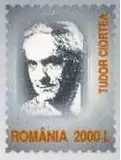Tudor Ciortea
Tudor Ciortea (28 November 1903 – 13 October 1982)[1] was a Romanian composer, musicologist, and music educator.

Life and career
Ciortea was born in Brașov and began his music studies under Gheorghe Dima in Cluj. He went on to study at the Bucharest Conservatory (now the National University of Music) under Ion Nonna Otescu and in Paris under Nadia Boulanger and Paul Dukas. He lived most of his life in Bucharest where he taught for over thirty years at the Bucharest Conservatory.[2][3] Amongst his students there were the composers Liana Alexandra, Irina Odagescu, Maya Badian, and Carmen Petra-Basacopol.
His compositions concentrated on chamber music and art song and were influenced by the French chamber music tradition and the traditional folksongs of Transylvania.[2] According to Nicolas Slonimsky, Ciortea's best chamber music was remarkable for its "contrapuntal complexity."[3] In 1964, Ciortea won the "George Enescu prize" of the Romanian Academy for his octet Din isprdvile lui Păcală (Some of Păcală's Exploits).[4]
The Tudor Ciortea Memorial House in Brașov contains some of his personal effects and instruments as well as a portrait of his daughter, the dancer and choreographer Vera Proca-Ciortea. The music school, Liceul de Muzica "Tudor Ciortea", in Brașov is named in his honour as is the city's annual chamber music festival.[2][5]
References
- The exact dates of Tudor Ciortea's birth and death can vary between sources. The dates here are taken from the records of the Brașov County Library: Calendarul aniversărilor culturale locale în anul 2013. Retrieved 25 April 2013 (in Romanian).
- Sadie, Julie Anne (2005). Calling on the Composer: A Guide to European Composer Houses and Museums, p. 150. Yale University Press
- Slonimsky, Nicolas (1965). "Modern Composition in Rumania", p.240. The Musical Quarterly, Vol. 51, No. 1. Retrieved 25 April 2013 (subscription required).
- Giurescu, Constantin C. and Matei, Horia C. (1974). Chronological history of Romania, p. 376. Editura enciclopedică română, National Commission of the Socialist Republic of Romania for UNESCO
- Liceul de Muzica "Tudor Ciortea". Istoric". Retrieved 25 April 2013 (in Romanian)